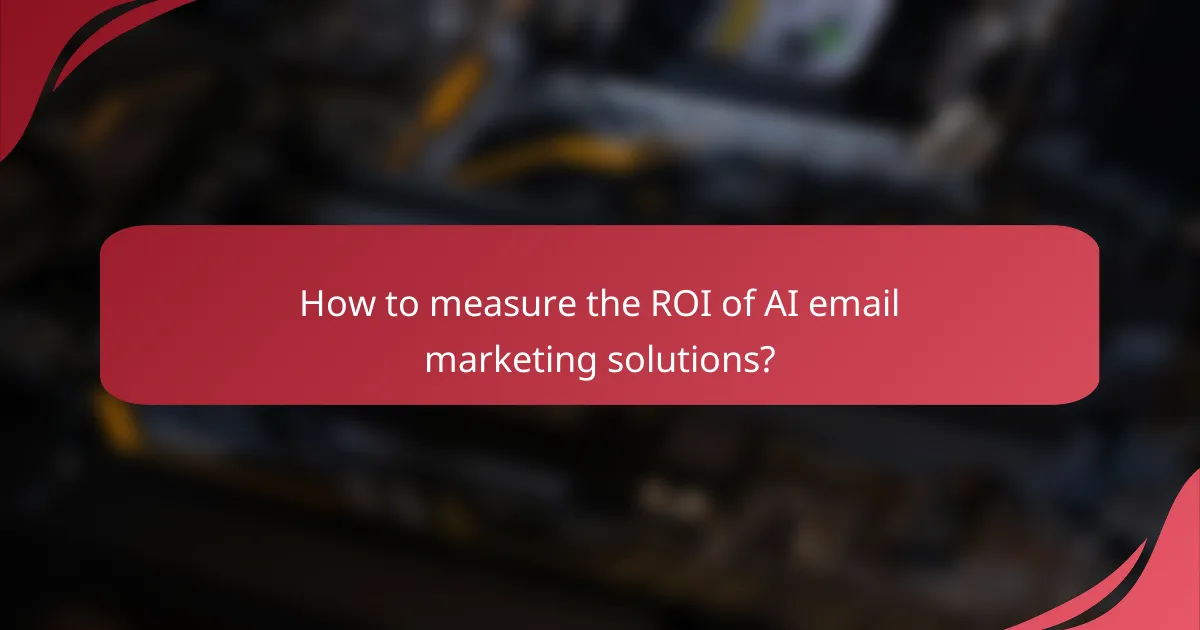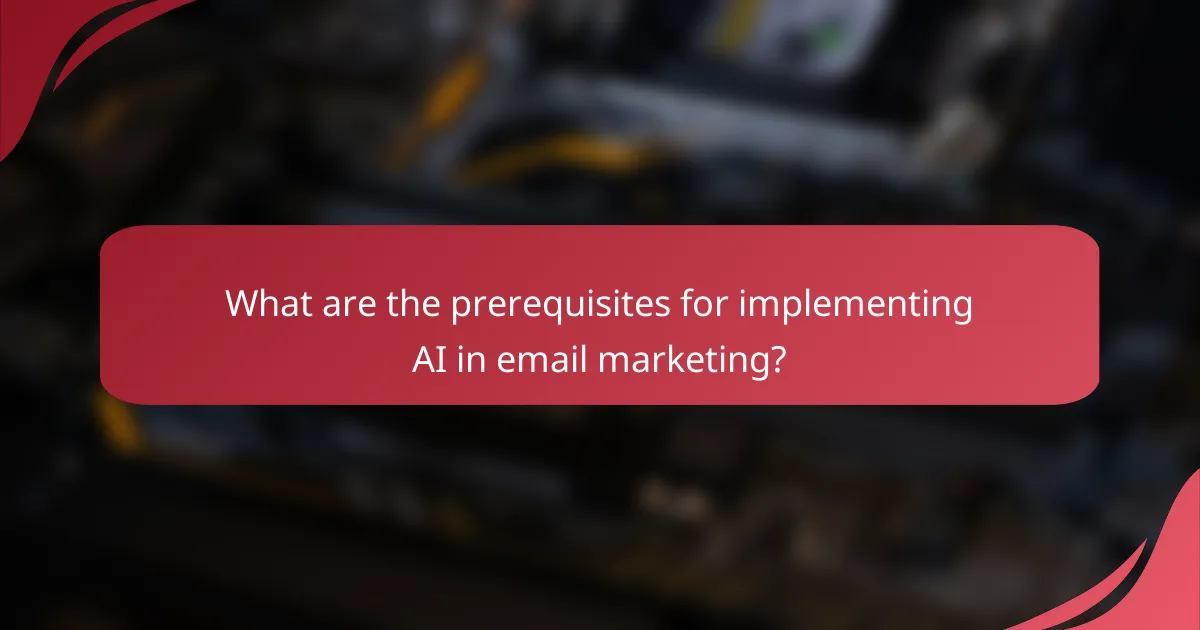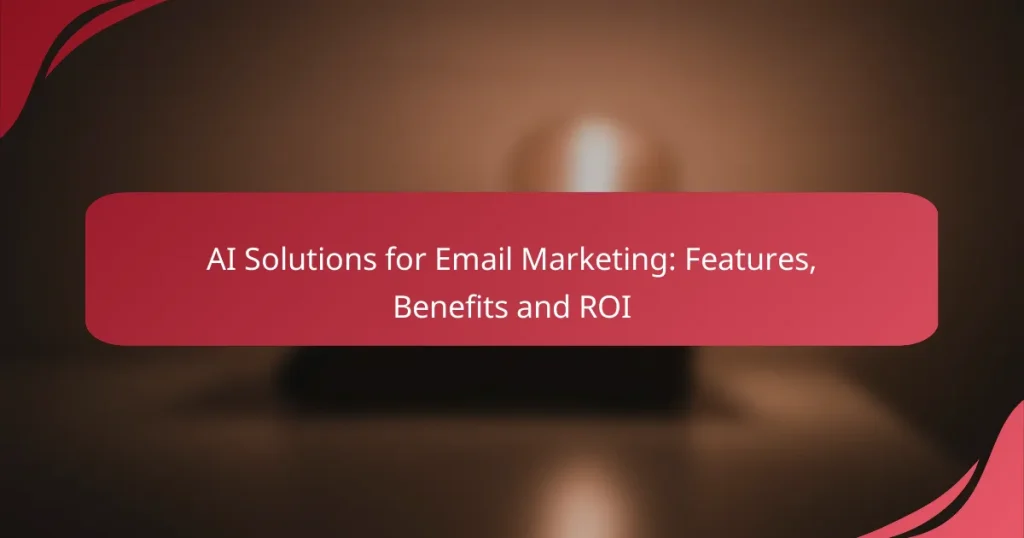AI solutions for email marketing are revolutionizing the way businesses engage with their audiences by enhancing targeting, personalization, and overall efficiency. Platforms like Mailchimp, HubSpot, and ActiveCampaign utilize advanced features to optimize campaigns, resulting in improved engagement and higher conversion rates. By analyzing user behavior, these tools tailor messages to drive results and significantly boost return on investment.

What are the best AI solutions for email marketing?
The best AI solutions for email marketing enhance targeting, personalization, and efficiency, leading to improved engagement and higher conversion rates. Notable platforms like Mailchimp, HubSpot, and ActiveCampaign offer unique features that leverage AI to optimize email campaigns.
Mailchimp’s AI-driven segmentation
Mailchimp utilizes AI-driven segmentation to analyze customer data and create targeted audience groups. This feature allows marketers to send tailored messages based on user behavior, preferences, and demographics, increasing the likelihood of engagement.
For example, Mailchimp can automatically segment your audience into categories such as new subscribers, frequent buyers, or inactive users. This targeted approach can improve open rates by 20-30% compared to generic email blasts.
To maximize effectiveness, regularly update your segments based on evolving customer data and campaign performance. Avoid over-segmentation, which can complicate your strategy and dilute messaging.
HubSpot’s predictive lead scoring
HubSpot’s predictive lead scoring uses AI to evaluate and rank leads based on their likelihood to convert. This feature analyzes historical data and user interactions to assign scores, helping marketers prioritize outreach efforts effectively.
Leads with higher scores are more likely to engage with your content and make a purchase, allowing for a more focused allocation of resources. For instance, businesses can see a 15-25% increase in conversion rates by targeting high-scoring leads.
Ensure your scoring model is regularly refined with new data and feedback. Avoid relying solely on automated scores; combine them with qualitative insights for a comprehensive view of your leads.
ActiveCampaign’s automated workflows
ActiveCampaign offers automated workflows that streamline email marketing processes, allowing businesses to send timely and relevant messages without manual intervention. These workflows can be triggered by specific user actions, such as signing up for a newsletter or abandoning a cart.
For example, a workflow might automatically send a follow-up email to users who clicked on a product link but did not make a purchase, potentially increasing sales by 10-20%. Customizing these workflows based on user behavior enhances personalization and engagement.
To implement effective workflows, map out customer journeys and identify key touchpoints. Avoid creating overly complex workflows that may confuse users or lead to missed opportunities. Regularly review and optimize your workflows based on performance metrics.

How do AI solutions enhance email marketing performance?
AI solutions significantly boost email marketing performance by optimizing content delivery and personalization. By analyzing user behavior and preferences, these tools can tailor messages to increase engagement and drive results.
Improved open rates
AI enhances open rates by crafting subject lines that resonate with target audiences. Machine learning algorithms analyze past email performance and user interactions to suggest optimal phrasing, timing, and even emojis that can capture attention.
For example, A/B testing powered by AI can determine which subject lines yield the highest open rates, allowing marketers to refine their strategies continuously. This targeted approach can lead to open rates that exceed industry averages by significant margins.
Higher conversion rates
AI solutions drive higher conversion rates by personalizing email content based on user data. By segmenting audiences and delivering tailored messages, businesses can create a more relevant experience that encourages recipients to take action.
Additionally, AI can predict the best times to send emails based on user activity patterns, maximizing the likelihood of conversions. Marketers should focus on integrating AI tools that provide insights into customer journeys, enabling them to craft compelling calls-to-action that resonate with specific segments.

What are the key features of AI email marketing tools?
AI email marketing tools offer advanced features that enhance campaign effectiveness, streamline processes, and improve customer engagement. Key features include personalization capabilities, behavioral targeting, and dynamic content generation, all of which contribute to higher return on investment (ROI) and better customer experiences.
Personalization capabilities
Personalization in AI email marketing tools allows businesses to tailor messages based on individual customer preferences and behaviors. This can include using the recipient’s name, recommending products based on past purchases, or sending targeted offers that align with their interests.
Effective personalization can significantly boost open and click-through rates, often leading to increases in conversion rates. Consider segmenting your audience based on demographics or purchase history to maximize the impact of personalized campaigns.
Behavioral targeting
Behavioral targeting uses data on customer interactions to send timely and relevant emails. By analyzing user behavior, such as website visits or previous email engagements, AI tools can determine the best times to send messages and what content will resonate most with each recipient.
Implementing behavioral targeting can lead to more effective campaigns, as emails are sent when customers are most likely to engage. Ensure you have robust tracking mechanisms in place to gather the necessary data for effective targeting.
Dynamic content generation
Dynamic content generation allows marketers to create emails that automatically adjust their content based on the recipient’s profile or behavior. This means that different users can see different images, offers, or messages within the same email template, enhancing relevance and engagement.
To leverage dynamic content effectively, ensure your email platform supports this feature and that you have clear data segments. This approach can lead to higher engagement rates, as recipients receive content that speaks directly to their needs and interests.

What benefits do businesses gain from AI in email marketing?
Businesses leveraging AI in email marketing can achieve significant improvements in efficiency, cost savings, and customer understanding. By automating processes and analyzing data, companies can enhance their marketing strategies and drive better results.
Increased efficiency
AI streamlines email marketing by automating tasks such as segmentation, scheduling, and content personalization. This allows marketers to focus on strategy rather than repetitive tasks, leading to faster campaign execution.
For instance, AI tools can analyze customer behavior in real-time, enabling businesses to send targeted emails at optimal times. This not only improves open rates but also increases engagement, as messages are tailored to individual preferences.
Cost-effectiveness
Implementing AI in email marketing can lead to reduced operational costs. By automating processes, businesses can minimize the need for extensive manpower, allowing teams to allocate resources more effectively.
Moreover, AI-driven insights can help optimize marketing budgets by identifying the most effective strategies. Companies may see a return on investment (ROI) that significantly outweighs the initial setup costs, often resulting in higher conversion rates and lower customer acquisition costs.
Enhanced customer insights
AI provides deeper insights into customer behavior and preferences, enabling businesses to create more effective marketing strategies. By analyzing data from various sources, AI can identify trends and patterns that inform email content and timing.
For example, AI can segment audiences based on past purchases or engagement levels, allowing for highly personalized campaigns. This targeted approach not only increases customer satisfaction but also fosters brand loyalty, leading to repeat business.

How to measure the ROI of AI email marketing solutions?
Measuring the ROI of AI email marketing solutions involves evaluating the financial returns generated from your campaigns against the costs incurred. Key metrics include conversion rates, customer acquisition costs, and overall revenue growth attributed to AI-driven strategies.
Tracking conversion metrics
Conversion metrics are essential for assessing the effectiveness of your AI email marketing efforts. Focus on key indicators such as click-through rates (CTR), open rates, and sales conversions. For example, a CTR of 2-5% is often considered good, while higher rates indicate strong engagement.
To track these metrics effectively, use analytics tools that integrate with your email platform. Set clear goals for each campaign, such as a specific increase in sales or sign-ups, and monitor performance against these benchmarks regularly.
Analyzing customer engagement
Customer engagement analysis helps you understand how recipients interact with your emails. Look at metrics such as time spent reading emails, response rates, and social shares. High engagement often correlates with better conversion rates, making it a critical area to evaluate.
Utilize AI tools to segment your audience based on engagement levels. This allows for targeted campaigns that can improve overall performance. Regularly review engagement data to refine your strategies, ensuring that your content remains relevant and appealing to your audience.

What are the prerequisites for implementing AI in email marketing?
To implement AI in email marketing, businesses need a solid foundation of data, technology, and strategy. This includes having access to customer data, appropriate software tools, and a clear understanding of marketing goals.
Data Quality and Quantity
High-quality, relevant data is essential for AI systems to function effectively in email marketing. Businesses should collect and maintain comprehensive customer profiles, including demographics, purchase history, and engagement metrics. The more data available, the better AI can analyze patterns and predict customer behavior.
Technology Infrastructure
Implementing AI requires robust technology infrastructure, including email marketing platforms that support AI functionalities. Companies should evaluate tools that offer features like automated segmentation, predictive analytics, and personalized content generation. Integration with existing systems is crucial for seamless operations.
Clear Marketing Objectives
Before deploying AI in email marketing, businesses must define clear objectives. Whether the goal is to increase open rates, improve customer retention, or boost sales, having specific targets helps guide AI implementation. Regularly reviewing these objectives ensures alignment with overall marketing strategies.
Skilled Personnel
Having personnel skilled in data analysis and AI technologies is vital for successful implementation. This may involve training existing staff or hiring new talent with expertise in AI and digital marketing. A knowledgeable team can better leverage AI tools to enhance email marketing campaigns.
Compliance with Regulations
Compliance with data protection regulations, such as GDPR or CCPA, is a prerequisite for implementing AI in email marketing. Businesses must ensure that customer data is collected and used in accordance with legal standards. This not only protects the company but also builds trust with customers.

